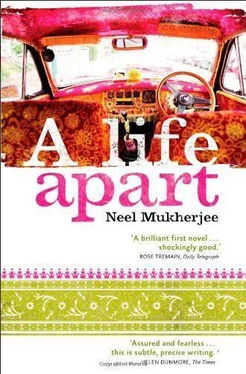Maybe.
In public, this takes on a sharper edge. Then, it seems Gavin is intent on pulling him down. Ritwik becomes some sort of a clownfreak for whom Gavin has to apologize even at the same time as he’s expected to perform for others. It is quite relentless; Gavin doesn’t seem capable of any other mode with him in public. Sometimes it’s funny, this you must treat Ritwik with indulgence, he’s a third-world peasant disclaimer from Gavin. At other times, the sheer unchangingness of it grates on him. Maybe he reads too much into all this because he is touchy and feels insulted. It could all be ironic, all the time, in which case it would be very trendy and in.
So telling Gavin, even ironically, is out of the question. Besides, what could he say? Oh, Gavin, by the way, my mother keeps appearing in my room. This hash is really wicked, it steals up on you slowly. What were you saying about ‘index’ and ‘icon’? He doesn’t want to dent Gavin’s soi disant role of educator and civilizer. It’s a role that has taught Ritwik to smoothe over the jagged edges of his own behaviour, to learn to observe, ape and conform.
Gavin is full of contradictions in this way; for all his radical lefty politics, he occasionally jolts Ritwik with a type of old-guard parochialism, such as his firm belief in good breeding. On the back of some conversation about women — they are never very far from Gavin’s mind — he once said he didn’t see why people objected to arranged marriages: at least one could make sure then the girl came from a good family. This is a vital thing in Gavin’s book: he sets a high premium on manners, decorum, social niceties, impeccably behaved children. And he’s very aware of class. There is this girl he fancies, Miriam; she reads English and plays the cello. He tells Ritwik, ‘Wouldn’t it be great to have Miriam play the cello naked?’
Ritwik says, ‘You know, there’s a Buñuel film where a woman plays some Brahms at the piano, nude.’
Gavin’s mind is on other things. ‘That well-bred personality all thrown to the winds. . the cello between her legs. . oooff, I can’t bear to think about it,’ he rhapsodizes, then adds, ‘It would make her poshness piccante , you know, the contrast between good behaviour and. . and. . shocking, well, shocking. . WHORISHNESS.’ He pounces upon the word.
‘How do you know she’s well-bred and all that stuff?’
‘Oh, I know friends of hers. She went to a posh school in posh North London.’
Ritwik is a bit daunted, although this doesn’t last very long for he finds out, in a few months, that Gavin’s use of the word ‘posh’ is a bit loose, that Miriam went to what they call a bog-standard comprehensive, that she does not come from a posh (even by Gavin’s definition) bit of north London. But then, he thinks, there are two types of people. The first, his type, is the myopic, narrow sort: they take people exactly as they come — curly hair, glasses, crushed velvet trousers from a Marie Curie shop, plays the clarinet, hasn’t heard of Alain Resnais, etc etc. No more, no less. There is no other meaning behind these appearances and facts. They mean to him: curly hair, glasses, crushed velvet trousers from a Marie Curie shop, plays the clarinet, hasn’t heard of Alain Resnais, etc etc.
The second type, to which Gavin belongs, is endowed with a shrewd socio-historical perceptiveness. They meet people and extrapolate a whole complex context from their parents’ marital status, parents’ jobs, area of residence, school attended, etc etc. By themselves those elements are nothing but indices to further extrapolation. So Gavin tells him how Highgate and Mitcham lead to further, different meanings. By itself Highgate, or Mitcham, signifies nothing. It’s like a game in which corridors open to further niches and passages that might then lead to rooms. Or might not. Perhaps one day he is going to understand England and its people well enough to have that breadth of vision. He certainly means to.
His fellow-students in the group, or at least a couple of them, are helpful to him. Not in any egregious or patronizing way; they assume that cultures don’t translate neatly or dovetail into each other with a satisfying click, so they mostly leave him alone, or ask him questions to satisfy some minor curiosities. In the early days, when he was just beginning to settle in and get introduced to some of the students in college, a standard question was So is it very different then? Are you adjusting well? Is it a big shock? His equally anodyne answers were vague mutterings about No, not all that much, you know, we grew up reading Enid Blyton and, later, Agatha Christie and P.G. Wodehouse, or, Well, Calcutta is still such a colonial outpost …
An important question now seems to be, ‘How is it you read English Literature in India and came here to do more of it?’ He surprises them by revealing that English Literature, as an academic discipline, was first taught in India, not in England; English administrators and policy-makers thought that the study of English Literature would have an ennobling and civilizing effect on the natives. They are thrown a bit, even a little embarrassed by this.
Declan is more wide-eyed than most at this nugget of information. ‘Does that mean it’s compulsory in schools, like? Are you forced to read English Literature?’ he asks, incredulous.
‘No, it’s not forced, but it’s a discipline, a subject offered in universities. You can do a degree in it if you want to. Like Engineering or Maths.’
‘It’s a strange thought, isn’t it, thousands of Indians poring over Shakespeare and Keats,’ Declan says. Now that Ritwik has it pointed out to him by an outsider, it becomes unfamiliar, shifts patterns and configurations, like one of those exercises where he sits in his room and tries to imagine if there could be another him, looking in through a window at himself. What would that other he see? He often wants to look into his own room, locked and empty, from the outside; the bed, the books, the posters, all silent and waiting, as if they had a secret life of their own to which he couldn’t be privy, but living on the second floor put paid to that fantasy.
He knows where Declan’s coming from: how can anyone square a Dr. Johnson reader with images of loin-clothclad, emaciated farmers standing next to equally cadaverous cows? Play ‘The Association Game’ with a white man, say ‘India’, and pat will come the word ‘Poverty’; it’s a coupling branded in the western mind, and who can say it’s wrong? It’s etched in his mind too.
Sarah, sharp as ever, clothes this in other words, ‘So how do you feel about being a post-colonial subject still studying the imperialists’ literature?’
‘Well. .’ he shrugs and hedges the question. ‘It’s not quite like that, is it? Or not always.’
The unasked question is Did you go to an elite expensive school to come this far? He can almost see the unuttered assumptions buzz and collide like bluebottles against window panes: rich kid father must be well-connected or influential you know what they say about rich third-world people when they are wealthy they are wealthier than the extremely rich in the first-world privileged boy to have been bought an education which paved his way here .
But it’s not quite like that, not at all.
In Ritwik’s mind, there were two types of poverty. One, the unexperienced sub-Saharan type, some sort of a shrine for the western media, with images of devouring eyes; fly-encrusted lips of children; women and men and offspring reduced to bare, forked animals, a cage of awkward stubborn bones barely sheathed in polished skin. The other was the slow drip drip drip which did not decimate populations in one fell swoop but hounded you every fraction of your time, got under your skin, into every space in your head and made you a lesser person, an edgy jittery animal because, you see, it never finished you off but gnawed at you here and there just to remind you it was there and that you were powerless in its half-grip. Gloating and victorious, but sleazily so, poverty not as Death triumphant in a Bosch nightmare but instead, one of his low, seedy, taunting thieves.
Читать дальше












